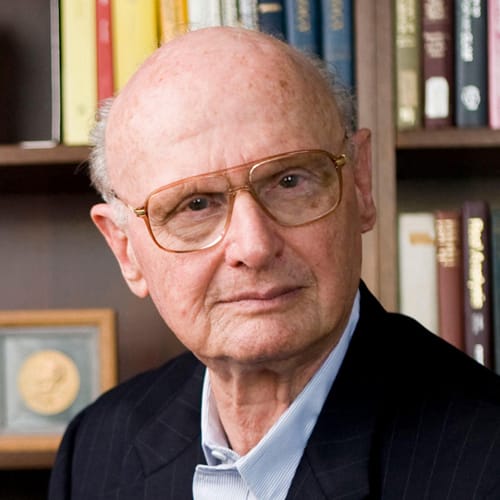
Harry Markowitz
Adjunct Professor of Finance (Retired)

- Profile
- Research Areas
- Industry Areas
Profile
The Rady School regrets to share the news that Harry Markowitz passed away on June 22, 2023 at the age of 95.
Markowitz was born on Aug. 24, 1927 in Chicago, as the child of Morris and Mildred Markowitz. During high school, Markowitz picked up an interest in physics and philosophy, in particular the ideas of David Hume, an interest he continued to follow during his undergraduate years at the University of Chicago. After receiving his B.A., Markowitz decided to continue his studies at the University of Chicago, choosing to specialize in economics. Here, he had the opportunity to study under important economists including Milton Friedman, Tjalling Koopmans, Jacob Marschak and Leonard Savage. While still a student, he was invited to become a member of the Cowles Commission.
Markowitz chose to apply mathematics to the analysis of the stock market as the topic for his dissertation. Jacob Marschak, who was the thesis advisor, encouraged him to pursue the topic, noting that it had also been a favorite interest of Alfred Cowles, the founder of the Cowles Commission. While researching the then current understanding of stock prices, which at the time consisted in the present value model of John Burr Williams, Markowitz realized that the theory lacks an analysis of the impact of risk. This insight lead to the development of his seminal theory of portfolio allocation under uncertainty, published in 1952 by the Journal of Finance.
In 1952, Markowitz went to work for the RAND Corporation, where he met George Dantzig. With Dantzig's help, Markowitz started to research optimization techniques, developing the critical line algorithm for the identifications of the optimal mean-variance portfolios, relying on what was later named the Markowitz frontier. In 1955, he received a Ph.D. from the University of Chicago with a thesis on the portfolio theory. The topic was so novel that while Markowitz was defending his dissertation, Milton Friedman jokingly argued that portfolio theory was not economics. During 1955-1956 Markowitz spent a year at the Cowles Foundation, which had moved to Yale University, at the invitation of James Tobin. He published the critical line algorithm in a 1956 paper and used the time at the foundation to write a book on portfolio allocation which was published in 1959.
Markowitz won the Nobel Prize in Economics in 1990, while a professor of finance at Baruch College of the City University of New York.
Research Areas
Optimization (especially Quadratic)
Theory of Rational Behavior Under Uncertainty
Software Development: Simulation
Software Development: Database
Industry Areas
Software for Simulation (especially Simscript)
MPT Consulting
